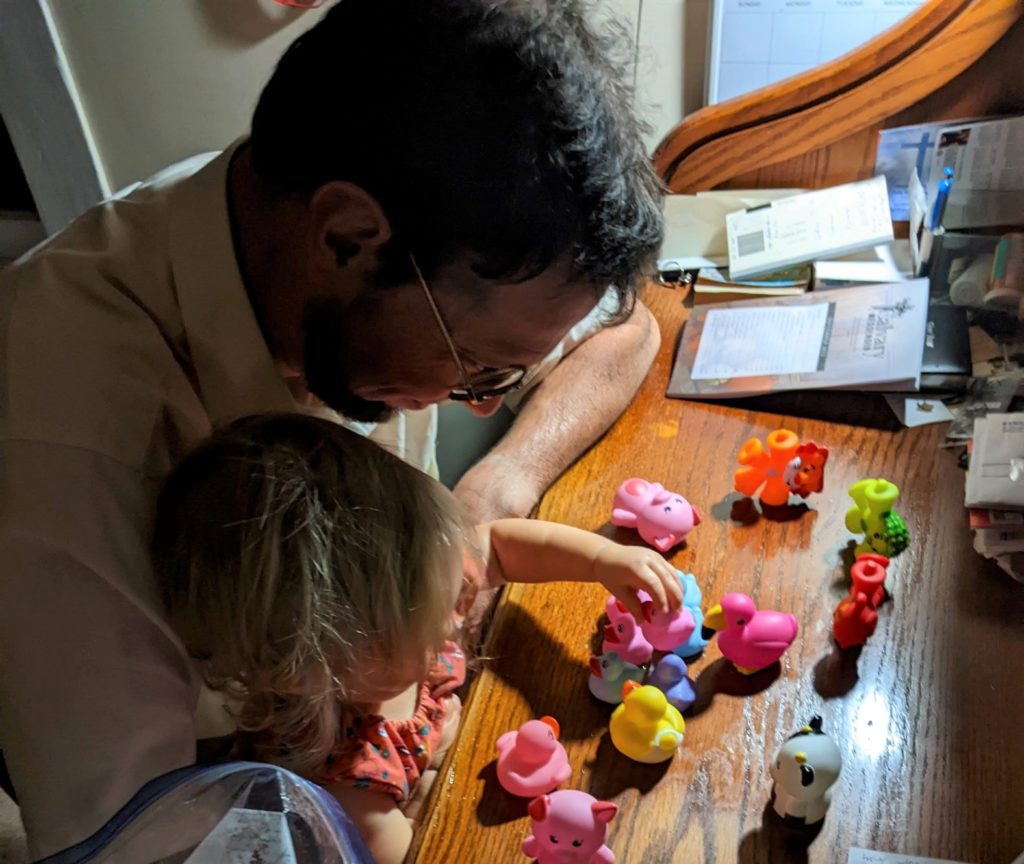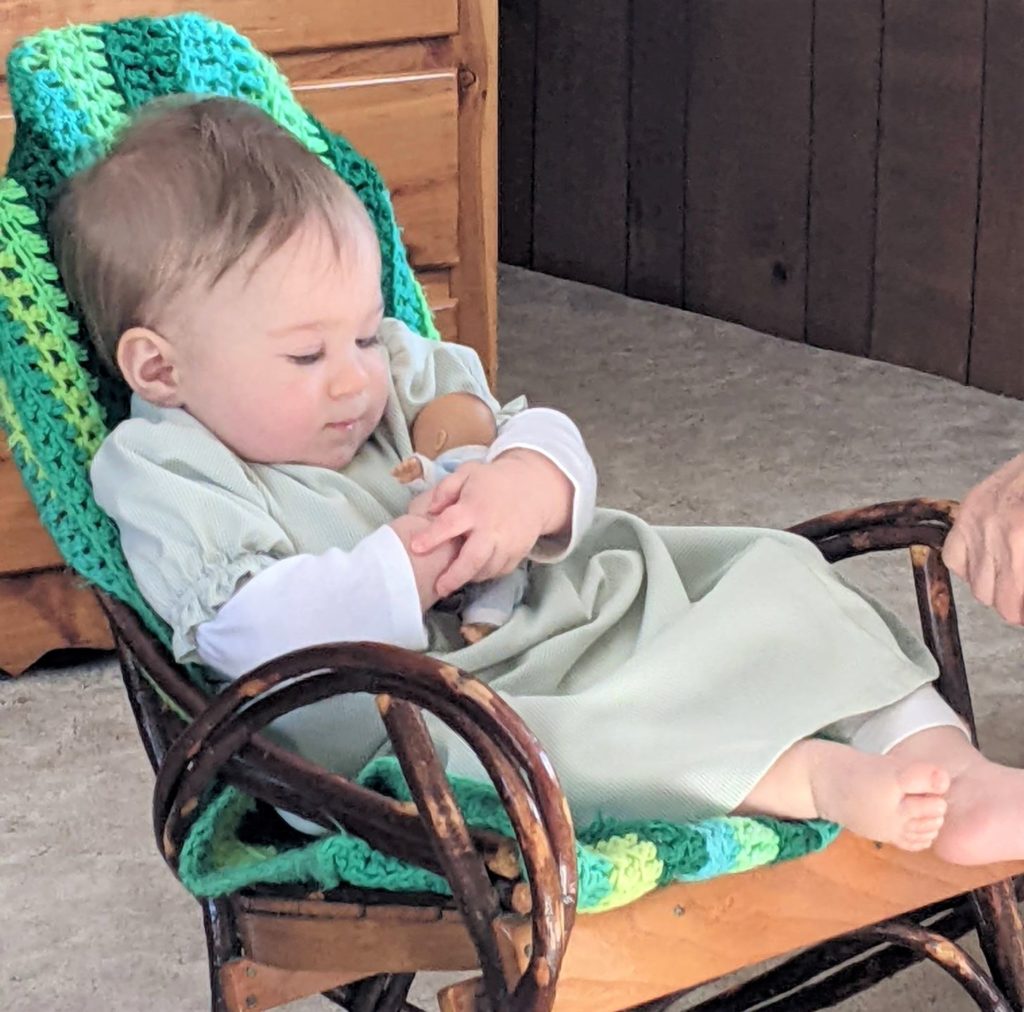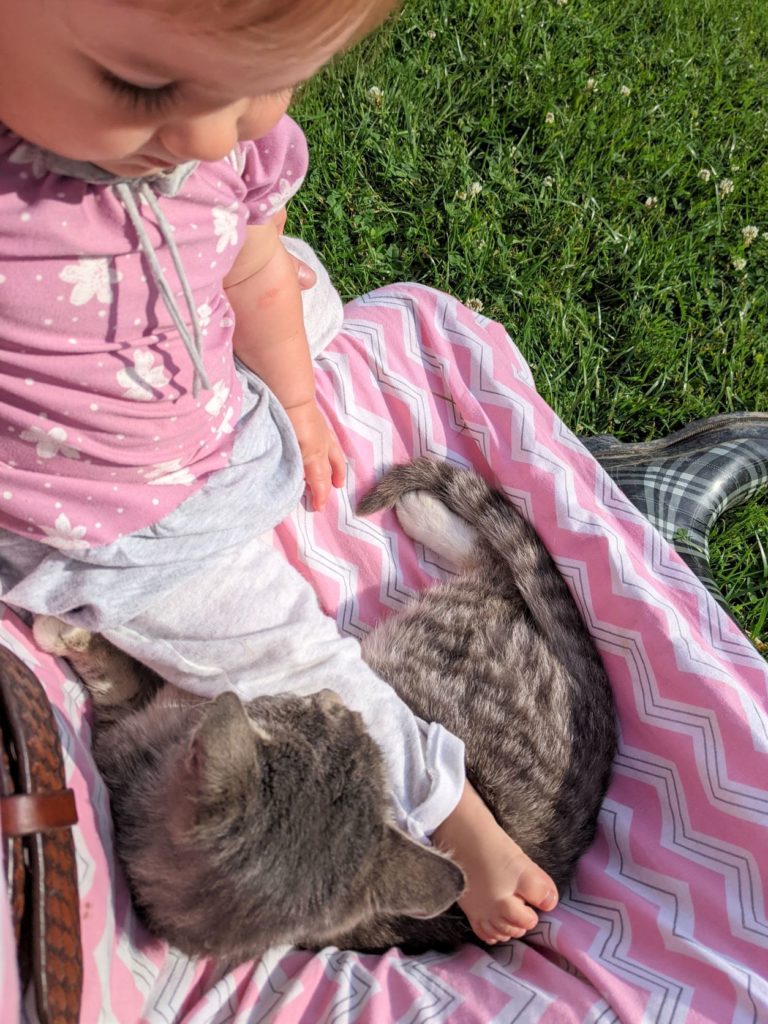In this closing post of my parenting series, I want to reiterate again that these opinions and perspectives spring from my specific experiences and goals. They are not intended as the be all end all in parenting, nor to imply that Mennonite parenting is better than other parenting. As parents, we all do the best we can with the knowledge and circumstances given us. My dad used to say that his most important child-raising tool was dependence on God, and I think at the end of the day, that’s the best place for a clueless, can-you-believe-I-have-this-thing-and-how-on-earth-am-I-going-to-parent-her parent to be.
Recently Annalise’s pediatrician said something interesting about boundaries. We were talking about the increased number of autism cases, and he said he believes in many cases children diagnosed as “autistic” are actually just children who haven’t learned boundaries. Don’t get me wrong–he confirmed he sees many cases of legitimate autism as well. But a school gets more government aid for an autistic child than for a child acting out, he said. And from his observation, rather than being autistic, some children haven’t been given boundaries at home and so haven’t developed the ability to control themselves in social situations.
I have been accustomed to thinking about “discipline” in conjunction with raising a child, not so much about boundaries, although the two words could in some ways coincide.
In conservative Mennonites culture, discipline for children is considered important. A well-disciplined child should obey a parent or authority figure right away when given a command, know how to sit quiet in church, and not throw a fit when something doesn’t go her way. Like my peers, I consider disciplining my child an important part of her development, so she won’t grow up “spoiled” or self-willed. And I have discovered in myself (I suspect also like many of my peers) the not-so-good tendency to worry more about how Annalise’s behavior will make me look than to worry about effects of the behavior on the child herself. I have considered over and over again the proper use of discipline, how much is too much, how much is too little. But before my conversation with the doctor, I never thought of discipline in conjunction with boundaries.
For me, discipline has gathered a semi-negative connotation. Discipline means punishing a child who does something wrong or inappropriate, in the interest of teaching them habits of morality and self-control. Boundaries, though. Thinking of child training not just as discipline, but as teaching a child boundaries, makes so much sense. Boundaries may at times be taught through punishment, but they are more often taught through modeling respect and small consistent behaviors every day.

For example, when Annalise and I pick up her toys at bedtime (and lest you think she’s a paragon, at this point I’m still doing most of the work), this is teaching a boundary. Toys belong in the toybox. When she throws food from her highchair and we tell her “No,” and show her where to put the discarded food in the pocket of her bib, this is teaching a boundary through positive reinforcement (so much more effective, we’ve discovered, than just saying “No” and snapping her fingers). These things are baby-sized boundaries, but as she gets older, she will need to learn other boundaries: not using unkind words toward another human being, not taking what does not belong to her, not intruding into someone’s personal space.
One way that Ivan and I are trying to help Annalise understand boundaries is by allowing her the power of choice rather than snatching “no-no’s” away from her. We only use one child lock on one kitchen cupboard that stores cleaning supplies. For the rest of the child level cupboards, I keep an eye on things and tell her “No” if she gets into something she shouldn’t. I expect her to listen and punish her if she doesn’t (and yes, obedience is also a work in progress).
Along with that, I try to create boundaries only for things that really matter. For example, I let her pull books off the shelf because I can easily help her pick them up again later. But I don’t let her empty the cupboard of my kettles or my good glass dishes, both because she might hurt herself and because it makes a lot of clean-up work for mom later. I want her to understand boundaries, but I also want her to feel like this is her world and her house, with plenty of room to explore.
Another word for boundaries might be respect. Respect for other people. Respect for creation. Respect for oneself.

I remember attending a college creative writing class when I was in my early twenties and realizing the value of the boundaries that were a part of my life and my culture. Some of the boundaries, like wearing cape dresses or wearing dark hose to church, may have seemed nonessential or even silly. But my dad had taught me those boundaries were important in order to respect the feelings and preferences of other people in my church group. The reasons for other boundaries, like not reading books or watching movies high in graphic violence or sex, seemed fairly self-evident for a Christian. Whatsoever things are true, honest, just, pure, lovely, the apostle Paul writes, if there be any virtue, and if there be any praise, think about these things.
In my creative writing class–out in a world where, to my sheltered eyes, there seemed few boundaries about what people could say, do, or write about–I saw so much sadness and loss of innocence it shocked me. I realized for the first time how my boundaries had protected me, how they had preserved within me a space for joy, innocence, and wonder.

We may know we should set boundaries for children, but along with that, I think we should also consider setting boundaries for ourselves. Yes, maybe we are old enough to know there’s terrible violence in the world, but that doesn’t mean we should take the liberty of watching graphic violence on television or in movies. There may be a time and place to watch such things, but not as an everyday diet. Our spirits, like our children’s, can be hardened, deadened, or made afraid. I believe we will be healthier and happier as persons and as parents if we set boundaries on what we allow into our own lives as well as our children’s.
Your turn! What are your tips, insights and experiences regarding boundaries?
This is the end of my series on how my Plain Mennonite background impacts my parenting. Flip back through the series to read posts on children as normal, self-reliance, and family togetherness.
P.S. I want to do a special 3-day Christmas sale on all my books, so check back tomorrow if you’re interested in hearing about that.

I have greatly enjoyed this series! And this post especially! I have witnessed how very little structure and few or arbitrary boundaries leave a child feeling insecure and unloved. I am so thankful my parents loved me enough to set boundaries and to teach me why we have boundaries. I think that’s an important part too as a child grows older – to help them understand why boundaries are put in place and to dialogue about it when necessary.
I love the thoughts here! Boundaries with positive reinforcement. Yes! Keeping a space for innocence and joy. Yes.
For your stage with Annalise, and on this topic specifically, I’ve enjoyed reading The Montessori Toddler. Lots of ideas on boundaries and encouraging independence while keeping little ones safe.
Thanks for that tip, Amy! I will check it out.
Yes, amen, thanks for your comment, Jacinda.
I’ve been enjoying the good words here! Also so thankful I was given boundaries from little up. Now as an adoptive Mom, I struggle often to hold the line and require respect, and to model respect at the same time. To not make everything a battle but to also be consistent. That first comment makes so much sense. Children feel unloved and unsafe without healthy boundaries. And my now-adult self too – I need to be more aware of that.
Bless you for your heart in adopting, Grace. I always love to see couples stepping up in that way.
And to remember that what works with one child might not work with the next child’s nature. I guess God wants us to keep relying on Him for help by giving a mixture of natures along with our multiple children 😁
That’s what mothers of multiple children keep telling… you think you have it all figured out finally for the first child, and then the second one comes along. 🤔
As a Nana, I’ve totally enjoyed your little series! Adults and children who live within their boundaries are truly so much happier!
Keep writing! I enjoy reading here!
Thank you. ☺️
I want to thank you for your parenting series! My family is not Mennonite, but we live among many Mennonite families. We are a Christian homeschooling, rice-farming family of seven in Northern California. We read all of your posts & have enjoyed all of your books so much! Please, keep writing! We love your gentle, kind wisdom & wonderful humor! We also really enjoy the “little window” you give us into the lives of our Mennonite neighbors—knowing more is helping us love them better! Before, we tended to shy away—worried about offending them if they saw our daughters wearing blue jeans, etc. What you’ve taught us has made us more brave in reaching out & interacting! Our children even attended their vacation Bible school over the summer! Our family is grateful to you!
Oh that’s so encouraging! Thank you!
Pingback: How my Plain Mennonite Heritage Impacts my Parenting - Lucinda J Kinsinger
I don’t want to digress from your point as I know this wasn’t the point you were trying to make, boundaries in a baby and child’s life are so important…but I had heard the same as the doctor told you “he said he believes in many cases children diagnosed as “autistic” are actually just children who haven’t learned boundaries.”
I found out this thinking is not reality…Unless he personally had this happen with his child, misdiagnosed with autism when it was really training needed, it grieves me that people say this.
Having been thrust into the world of autism, through the years and different states, I have never met an autistic child that “just had not been trained.” I am not saying that it isn’t possible and doesn’t happen but I have personally seen the opposite, children being mistreated and misunderstood because they were not diagnosed and taken care of the way they need to be. Nothing helps these children like patience, loving guidance, unconditional love and acceptance.
Proverbs 13:24 tells us that “He who withholds his rod hates his son,
But he who loves him disciplines him diligently.” These are wonderful words that I know to be true!
I also know the painful grief of having children locked away in the prison of “broken brains”. Unable to love and laugh and live like we do, the world is hostile place to these precious little ones, that Jesus loves so much. Life is a confusing and difficult place for them.
I know now, that to plant the thought that “perhaps they just weren’t trained”, is devastating.
I understand that often people don’t understand autism/spectrum disorders. Jesus does understand…and His love for these “little ones” is a love I never knew until I entered this world of “broken brains” and saw His tender love for them.
This has been my world for years now, a world I would never have chosen, a world I would never want any parent to have to enter, but also a world where the love of Jesus for these “little ones” is so evident and real and a world where He is very close, if we look to Him.
He does give us beauty (for what may look like) ashes in our life every time, if we will give Him the ashes. He does make all things
beautiful. 🖤
I don’t claim to know it all, this is just from my experience.
Thank you so much for this, Anne. This is wise and kind and beautiful, and I very much thank you for commenting.
Love this series. Lots of food for thought. I wish every child in the world grew up in a home with loving parents! How much better would the world be today?!
I am blessed to read your thinking. I find myself driving about our Lancaster County thinking about some of your blog posts. They’re well-written and so full of insight and questions!
Discipline trains us towards how we want our society to behave. I would just encourage parents to put their efforts into discipline that makes sense to them. If a clean home is a demonstration of devotion to our Lord, then by all means have discipline to keep a clean home. But if a clean home is simply what your Mennonite neighbors want you to keep and not what you two as a couple want to keep, then that’s probably not where I’d apply my discipline?
And autism is just a term to group different ways of organizing the brain. God gives each of us different insights into His kingdom. Some people have brains organized in a way that works well within our society. We call those people “geniuses”. Others have brains that don’t seem to work as well within the structure of our society. We call those people “autistic”. I believe in my heart and I know in my head that God has a purpose for each of us. Just because I don’t understand that purpose, doesn’t mean that the purpose doesn’t exist.
And finally, this paragraph of yours below beautifully defines what binds us as Mennonites! What a healthy way to live in love! Bless you.
“We may know we should set boundaries for children, but along with that, I think we should also consider setting boundaries for ourselves. Yes, maybe we are old enough to know there’s terrible violence in the world, but that doesn’t mean we should take the liberty of watching graphic violence on television or in movies. There may be a time and place to watch such things, but not as an everyday diet. Our spirits, like our children’s, can be hardened, deadened, or made afraid. I believe we will be healthier and happier as persons and as parents if we set boundaries on what we allow into our own lives as well as our children’s.”